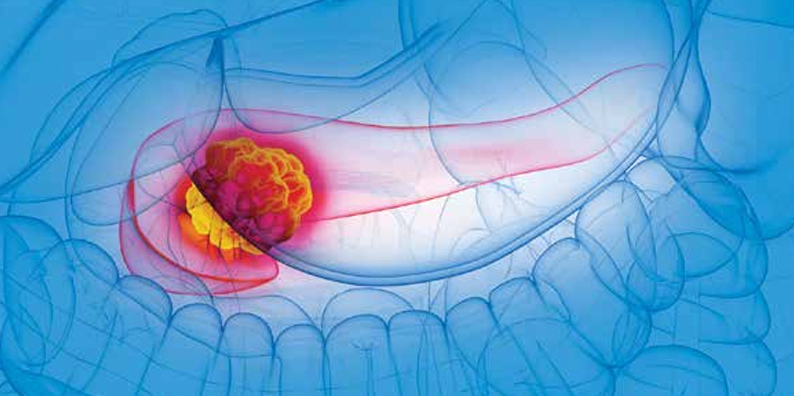Ibrutinib Single-handedly Impacts Immune Environment in Metastatic PDAC
According to a phase 1b study, ibrutinib can modulate immune response and lead to some promising immune effects for patients with metastatic pancreatic ductal adenocarcinoma.
Lawrence H. Fong, MD
Efim Guzik Distinguished Professor in Cancer Biology
Professor of Medicine Division of Hematology/Oncology
Leader, Cancer Immunotherapy Program
University of California, San Francisco
San Francisco, CA


The use of ibrutinib (Imbruvica) as a single agent demonstrated more of a positive effect on the tumor microenvironment than the Bruton tyrosine kinase (BTK) inhibitor in combination with nab-paclitaxel (Abraxane) and gemcitabine chemotherapy for patients with metastatic pancreatic ductal adenocarcinoma (PDAC), according to an analysis of immune effects seen in a phase 1b trial (NCT02562898) published in the Journal for ImmunoTherapy of Cancer.1
“[The study showed that] ibrutinib can modulate immune response and lead to some desirable [immune] effects [in patients with PDAC]. But, when we add chemotherapy on top of the ibrutinib, unfortunately it reduces the impact of the ibrutinib,” Lawrence H. Fong, MD, told Targeted Therapies in Oncology™ in an interview. Fong is a professor of medicine in the Division of Hematology/ Oncology and and leader of the Cancer Immunotherapy Program at the University of California San Francisco.
Nab-paclitaxel and gemcitabine is a standard frontline regimen for patients with metastatic PDAC, but studies are exploring the use of combination regimens, including with targeted therapy or immunotherapy, to continue to improve overall survival for this patient population.
In prior preclinical studies, ibrutinib demonstrated increased activity in murine pancreatic cancer cell lines and mouse models when administered in combination with gemcitabine compared with gemcitabine alone.
The open-label phase 1b/2 trial enrolled treatment-naïve patients with metastatic PDAC and analyzed the use of ibrutinib plus nab-paclitaxel and gemcitabine in terms of efficacy, safety, and immunopharmacodynamics. The design of the trial included a dose-escalation arm (n = 10) to determine the maximum tolerated dose for ibrutinib in the triplet regimen and an immune response arm (n = 14) that looked at the use of ibrutinib monotherapy’s impact on the immune landscape. In the immune response arm, patients received a 7-day run-in course of ibrutinib monotherapy prior to the addition of chemotherapy, with blood samples and biopsies taken before and after the run-in course.
At baseline, patients in the dose-escalation arm had a median age of 58 (range, 45-80), and most were women (60%), White (60%), non-Hispanic (80%), non-smokers (60%), non-drinkers (70%), and had an ECOG performance status of 0 (60%). Seven patients were evaluable in the immune response arm and had a median age of 69 (range, 53-81). Most of these patients were men (57%), White (85.7%), non-Hispanic (100%), nonsmokers (42.8%), nondrinkers (87.5%), and had an ECOG performance status of 1 (71.4%). None of the patients had a genetic predisposition or a family history of PDAC.
In terms of efficacy, the combination led to a partial response in 3 patients, stable disease in 9, and 2 had progressive disease.
The median overall survival (OS) was 234 days (95% CI, 84-412). In the dose-escalation cohort, the median OS was 246 days (95% CI, 84-not reached [NR]) and 170 days (95% CI, 66-NR) in the immune response cohort. Median progression-free survival (PFS) was 114 days (95% CI, 64-261) overall, 128 days (95% CI, 56-NR) in the dose-escalation cohort, and 99 days (95% CI, 64-NR) in the immune response cohort.
The median time to progression (TTP) was 126 days (95% CI, 72-261) in the overall population. In the dose-escalation cohort, the median TTP was 128 days (95% CI, 56-NR), and 126 days (95% CI, 64-NR) in the immune response cohort.
“We did not see a huge improvement over what we would expect to see with chemotherapy.... When you combine [ibrutinib] with chemotherapy there’s more of an interplay so that we don’t see the effects that we see with ibrutinib by itself,” Fong said.
Serious adverse events were reported in 50% of patients in the dose-escalation cohort, with blood bilirubin increase being the most common event for the group. Serious events were also seen in 37.5% of the immune response arm, with sepsis and infections being most common for this group.
Ibrutinib monotherapy led to a reduced frequency of B cells in the blood among patients in the immune response arm; changes in B-cell frequency did not correlate with BTK occupancy.
Increases in circulating monocyte populations were seen mostly in patients with high BTK occupancy compared with those with low BTK occupancy. Changes were reported in 7 monocyte clusters in peripheral blood mononuclear cells with single-agent ibrutinib, which were considered statistically significant. Absolute monocyte counts in the blood also increased with ibrutinib monotherapy.
The frequency of conventional DCs in the blood also increased following ibrutinib treatment. Increases were seen mostly in patients with high BTK occupancy. No trends were observed with other DCs. Comparatively in the tumor tissue, no change in the frequency of total DCs was reported, but patients with high BTK occupancy did show an increased abundance compared with those with low occupancy. In the tumor microenvironment, DCs showed a more mature phenotype, marked by positive expression of DC-LAMP, with ibrutinib treatment; this did not correlate with BTK occupancy.
“We found that ibrutinib could actually change the myeloid compartment, specifically the circulating monocytes and DCs, with treatment. And we saw some increase in those dendritic cells that include seeing more mature DCs within the tumor microenvironment,” Fong said. “One of the ways to think about it is shifting the myeloid compartment from being immunosuppressive, which is dominant in pancreatic cancer, to being immunostimulatory, which is part of the goal of immunotherapy. We could see increased in these immunostimulatory myeloid cells and DCs in particular.”
A trend was reported for reduced T-cell frequency in the blood, which was even more distinct in those with high BTK occupancy. Similar trends were seen for naïve, effector, central memory, and effector memory subpopulations of CD4-positive and CD8-positive T cells.
In the tumor microenvironment, all T-cell frequencies were reduced, but this did not correlate with BTK occupancy. Reduced frequencies of PD-1–positive EOMES-positive CD8-positive T cells were noted, with increased frequencies of PD-1–negative EOMES-positive CD8-positive T cells. However, this was more pronounced in those with high BTK occupancy.
Comparatively, the combination regimen led to a significant increase in classical monocyte frequency, a noticeable increase in intermediate and nonclassical monocytes, and increased absolute monocyte counts in the blood. Fewer natural killer cells were also reported with treatment, but no changes were considered significant for frequency changes in lymphocytes.
Both monotherapy and triplet therapy showed an impact on reduced T-cell receptor clonality, which was associated with response. T-cell receptor clonality was lower at all time points in patients who responded to treatment compared with patients who had stable disease or progressed on treatment. Patients who responded also showed higher levels of new B-cell receptor and T-cell receptor clones. Those with lower B-cell receptor and T-cell receptor clonality tended to also have longer median overall survival.
These differences in impact with monotherapy and triplet therapy led to questions about the possible blunting of the immunomodulation caused by ibrutinib with the cytotoxic chemotherapies, leading to a possible impact on clinical outcomes. As such, the study authors looked to future studies with other therapies to possibly enhance the immunomodulation of ibrutinib in patients with metastatic PDAC.
“Although this study is limited in the numbers of patients enrolled, it provides critical clues into the effect of ibrutinib therapy on the immune response, which may inform study design for future clinical trials,” Fong and the study authors concluded in their report.
REFERENCE
1. Sinha M, Betts C, Zhang L, et al. Modulation of myeloid and T cells in vivo by Bruton’s tyrosine kinase inhibitor ibrutinib in patients with metastatic pancreatic ductal adenocarcinoma. J Immunother Cancer. 2023;11(1):e005425. doi:10.1136/jitc-2022-005425
